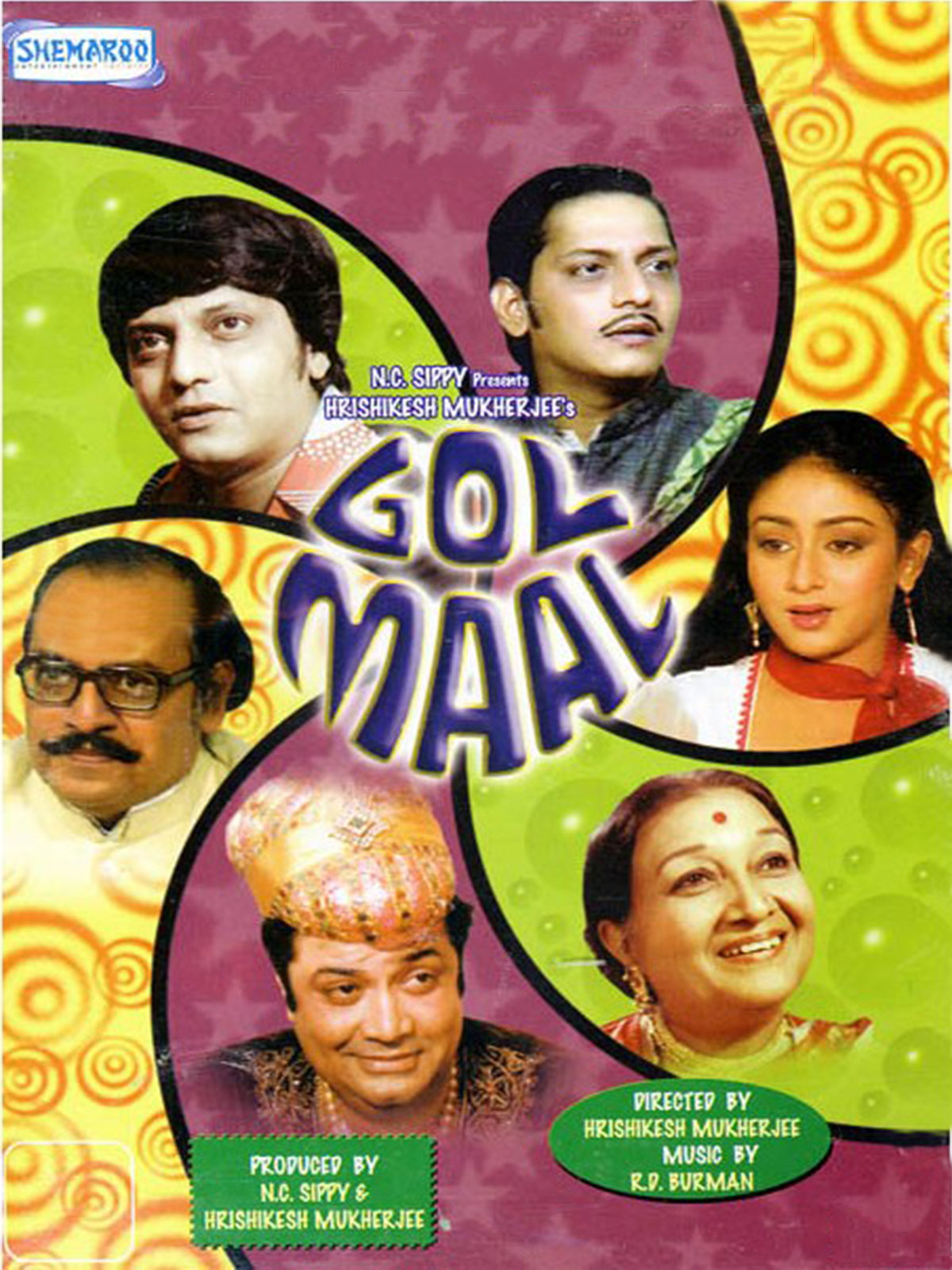Everyone takes comedy movies lightly, even the critics. The general assumption is that since the movie is fun to watch and deals with issues in a light-hearted manner, making it must also have been a cakewalk. Same goes for acting. We reserve great acting performances to gritty, emotional characters in epic movies full of pathos and tragedy. We never pause to give a second look to acting performances in fun movies that are so natural that you forget that they are acting.
Hrishida’s 1979 movie Gol Maal is a perfect example. The movie is so entertaining to watch that it is difficult to appreciate the high production values and nuances of characters unless you are really paying attention. Take the main character of Ramprasad Dashrathprasad Sharma (Amol Palekar). Within the first ten minutes, we are exposed to many different facets of his character. He is fanatic about sports, he is intelligent and hardworking, he has a flair for amateur dramatics and he can improvise and ad-lib as the situation demands. He is also a very good singer. The movie starts with him singing, we learn that his friends always request his singing performance so it seems only natural when he gets the job of music teacher to Urmila (Bindiya Goswami), Bhavani Shankar’s (Utpal Dutt) daughter. Dina Pathak who plays Mrs. Srivastava is a rich lady and acting is a hobby for her, not a profession. Bhavani has a set of strong likes and dislikes on which the whole premise of the movie is based. How many comedy movies build such rich, layered characters?
Amol Palekar is simply stunning. He has to play three characters. First one is Ramprasad, second one is a revised Ramprasad in his office, created in accordance to the preferences of Bhavani Shankar and third is the imaginary twin brother Lakshmanprasad Dashrathprasad Sharma who is an antithesis of Ramprasad. Amol Palekar was very active in Marathi and Hindi theatre during this time and it is due to his vast experience on stage that he juggles these characters and makes them come alive with an acting performance that is so effortless that you do not realise that he is acting. He is complemented by an equally splendid performance by Utpal Dutt who plays Bhavani Shankar. Dutt was a stalwart in Bengali and English Theatre with an equally illustrious career in Bengali and Hindi movies. Both these actors bring out subtle nuances of their characters very effectively, like Ramprasad shaking his head while speaking Shuddha Hindi to Bhavani, showing that he has to make great effort to speak in such an unnatural manner.
The attention to details in Gol Maal is uncharacteristic of most comedy movies. In the beginning, Ramprasad comes home and his sister is setting table for dinner. He goes into the bathroom, washes his hands and comes back, leaving the bathroom door open. His sister closes it without any comment as if it’s a routine occurrence. Such details add a richness to the characters and their relationships, so that despite being in a comedy they do not become one dimensional.
Unless your idea of a humour is someone slipping on a banana peel, dialogues are crucial in a comedy movie. In Gol Maal, Dr. Rahi Massom Raza pens some memorable lines that are not forgotten even today. The normal Hindi of Ramprasad, his excessively pure Hindi that he uses with Bhavani (“उनकी स्मृति मुझे प्रतिपल ये स्मरण दिलाती है की मनुष्य तो मृत्यु के बाद भी अपने विचारों और सिद्धांतों के द्वारा अमर रह सकता है”) and the carefree language of Lucky, all add to the flavour of the film. This does not mean that the movie is averse to physical comedy. One of the funniest scenes is when Mrs. Srivastava is sitting on a swing and and Bhavani tries to sit on it on the opposite side. Or when Lucky is talking with Bhavani, swinging his key-chain and Bhavani gets irritated and stops him.
Hrishida always had a fascination with how the made up world of Bollywood intersects with the real world. In Guddi, he made Dharmedra play himself in a story that revolved around the myths of stardom. In Gol Maal, he uses the same feature in innovative ways. Ramprasad dreams that he is a big star or a top singer who is singing with Lata Mangeshkar. Gulzar saab’s lyrics describe the situations beautifully (“लता गा रही थी, मैं तबले पे था, वो मुखड़े पे थी, मैं अंतरे पे था”). The intersection with Bollywood goes deeper. Deven Verma playing himself, is a buddy of Ramprasad and plays a crucial role in creating the doppelgänger of Ramprasad.
Another central theme of Hrishida’s movies is language – the way it is used and the mythical notion of pure and impure language. This was a central theme in his movie Chupke Chupke and it plays a central role here as well. The movies underline the fact that language is an ever evolving dynamic entity that cannot be bound by made up rules of grammarians sitting in their ivory towers.
Looking at these themes and connecting them with the entirety of Hrishida’s oeuvre, one realises that the richness in his characters and indeed in his movies is not accidental. It is a natural culmination of a life with rich background in literature and other fine arts.


